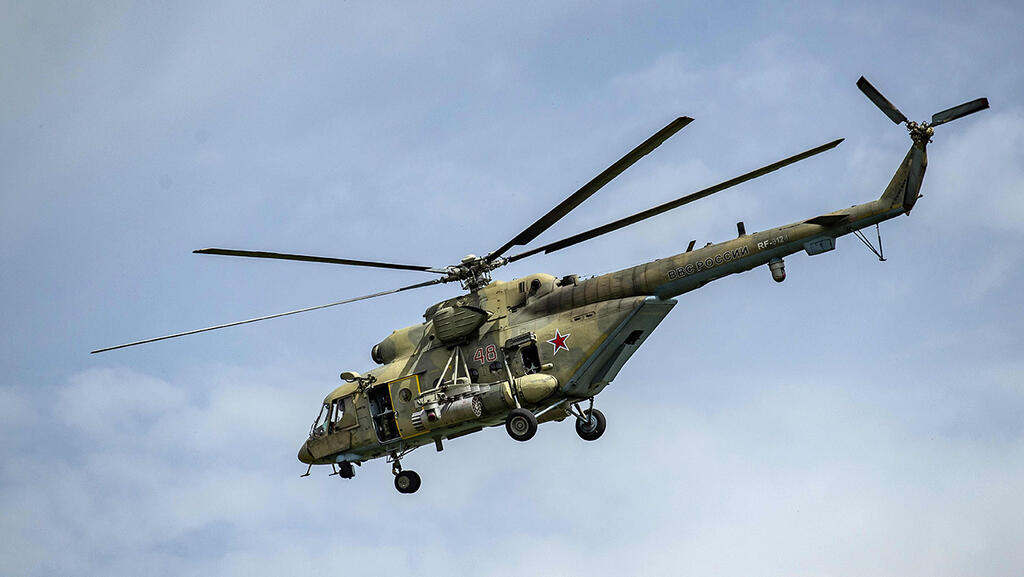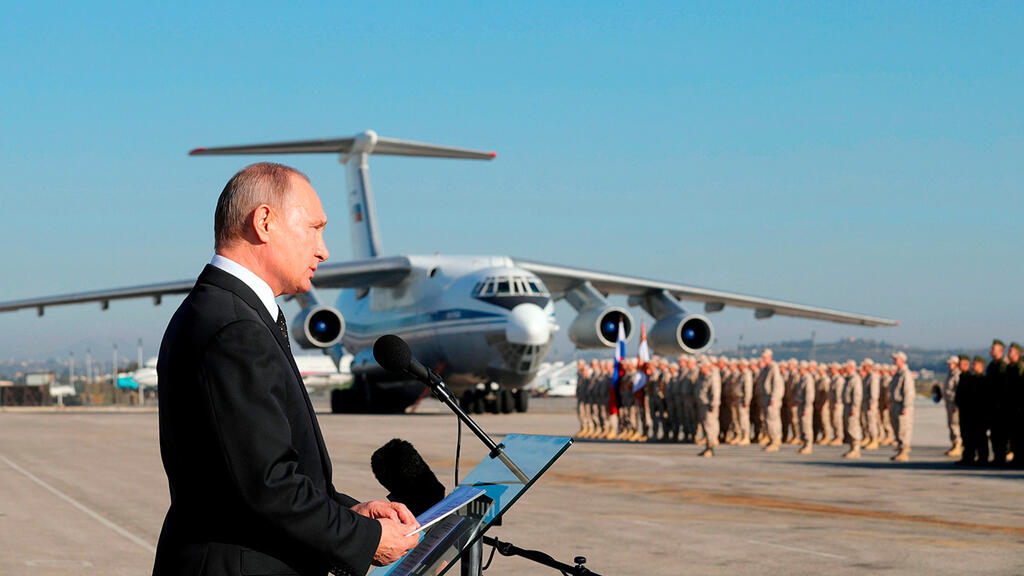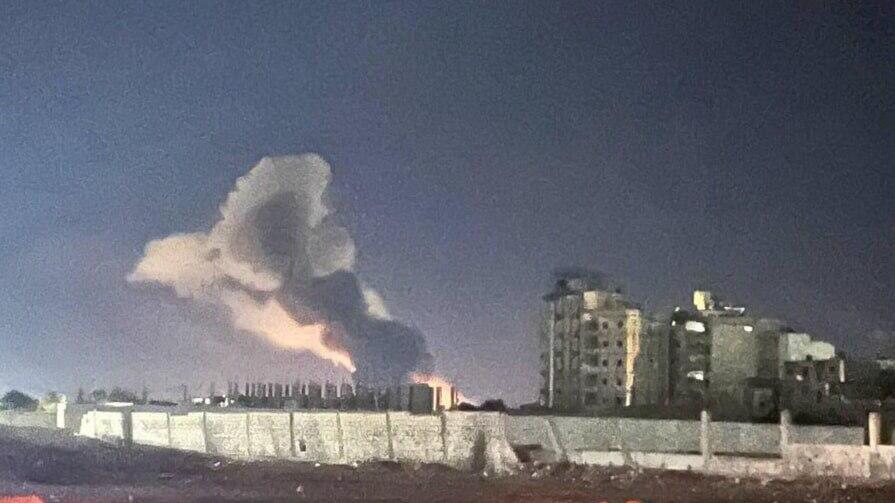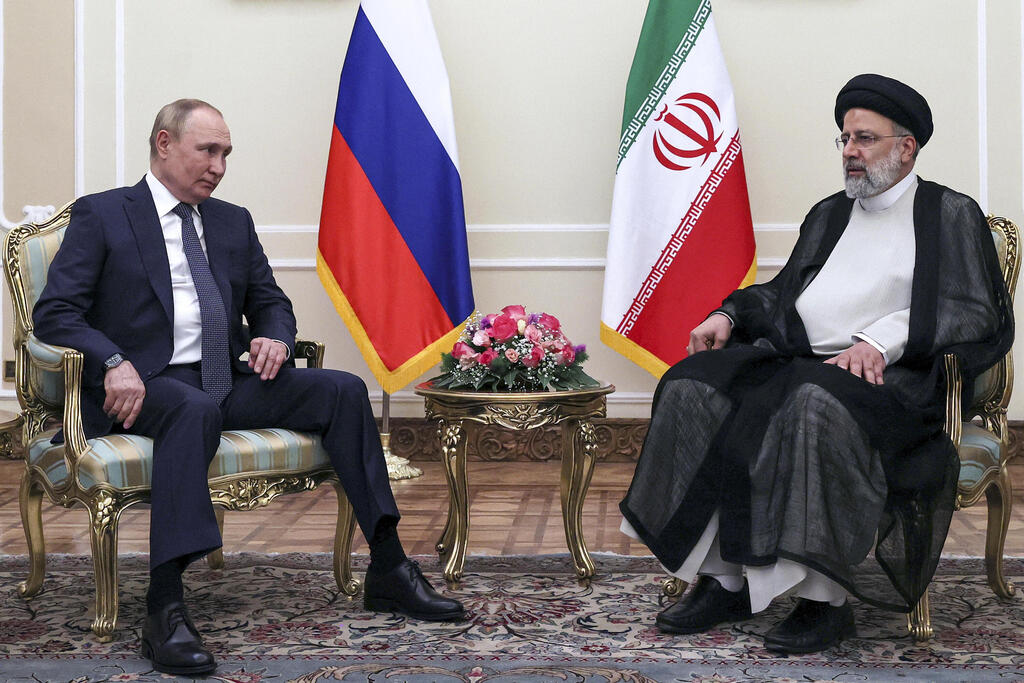Getting your Trinity Audio player ready...
Last week, a Russian helicopter flying near the cease-fire line in Syrian territory was seen from the Golan Heights. The Russian helicopter flew along the line for several minutes, then turned back eastward deep into Syria. The Israel Air Force tracked the helicopter, providing alerts to IDF forces and the military’s air defense batteries in the area. However, since the helicopter didn’t cross the cease-fire line into Israeli territory near the Golan Heights, no further action was needed.
More stories:
The day following the incident, which passed without special public or media attention in Israel, the official Russian news agency TASS released a statement announcing that Russian military aircraft had begun patrols along the "Bravo Line" between Israel and Syria to "monitor the situation."
Moscow's true goal, however, isn’t merely monitoring. In fact, against the backdrop of reports of increased Israeli activities in Syria, the Kremlin seeks to interfere and deter Israel from attacking Iranian targets, as well as Hezbollah and Palestinian elements operating in Syria in Hezbollah’s service, and prevent weapon transfers from Syria to Hezbollah, all under the guise of ostensibly monitoring the situation along the Israeli-Syrian cease-fire line.
It’s entirely clear that the presence of Russian helicopters or other aircraft in the Golan Heights region hinders Israel's operations in this airspace. According to foreign reports, a significant portion of the attacks in Syria attributed to Israel took place from Israeli territory in the Golan Heights and northern Israel.
Russia’s presence and Israel’s difficulty
The presence of Russian military aircraft in the region disrupts operations attributed to the Israel Air Force, and Russia can argue against Israel that our air force activities against targets in Syria from the Golan Heights and northern Israel directly endanger Russian aircraft and personnel in the region.
This claim may be based on an incident in September 2018 when the Israeli Air Force targeted weapon depots and ammunition caches in western Syria. Syrian air defenses, attempting to intercept the planes, launched dozens of surface-to-air missiles and accidentally shot down a Russian reconnaissance plane carrying 15 military personnel.
The presence of Russian forces along the border with Syria signals to Israel that the Kremlin is displeased with Israel's intensive operations against Syria, Hezbollah, and Iranian interests. It’s clear that Russia demands a reduction or cessation of these operations, without explicitly saying so.
In the past, Israel launched planes and delivered verbal warnings to the Russian operations center at the Khmeimim Air Base near Latakia in northwestern Syria. Russian warnings prompted them to move their aircraft away from the Israel-Syria border. It isn’t certain if Israel issued similar warnings now, but it can be assumed it’s been done.
Regardless, the Russians remain undeterred and continue flying along the cease-fire line. In essence, this represents an escalation in support for the radical Shiite axis led by Iran in exchange for Iran's support in Russia's military efforts against Ukraine. This practical escalation doesn’t bode well for Russia's operation against Israel at this time.
The Russian "patrols" are allegedly intended to "monitor" the implementation of the agreement between the countries in the Golan Heights, reached several years ago, in which the Syrian regime was made responsible for the things ongoing in the Golan Heights.
What isn’t less interesting than the statement is that it was issued on behalf of Russian General Rear Admiral Vadim Kulit, deputy head of the Russian Reconciliation Center for Syria, a mechanism that operates as part of the Russian command in Syria and is directly subordinate to the Russian Defense Ministry.
The Russian military’s new ground positions
Two weeks before the announcement of Russia’s aerial patrols, the Kremlin announced the establishment of two additional military positions along the Syrian border. In this case, as well, Kulit issued the statement, claiming this was allegedly done to "monitor" the cease-fire, "due to the increased frequency of provocations in the region."
The Russian Reconciliation Center for Syria diplomatically mediated between Israel and Syria about five years ago, aimed at enabling the Syrian regime to regain control of the Golan Heights through an agreement with Sunni factions, which were either close to or affiliated with Jabhat al-Nusra, the Sunni extremist organization that rebelled against the rule of Bashar al-Assad, which is based on the Shiite community.
This organization had bases in the Syrian Golan, but also had opponents among the local residents in the region, including Druze populations in Jabal al-Druze. While they opposed the regime, they weren’t willing to cooperate with an extremist Sunni-Islamist organization like Jabhat al-Nusra. These villages, located in southern Syria, received economic aid from Israel, and according to foreign reports, military aid.
The Russian Reconciliation Center for Syria mediated between the Syrian regime, southern Syrian villages, and the Jabhat al-Nusra organization, which was active in southern Syria at the time.
It successfully reached an agreement according to which Israel closed the field hospital it had established in the Syrian Golan Heights and stopped openly assisting the southern Syrian villages. In return, Jabhat al-Nusra committed to relocating its operatives to the Idlib province in northwestern Syria and refraining from acting against Israel.
This agreement has remained in place to this day. Recently, however, Shiite-Syrian militias and Sunni-Palestinian militias have entered the Golan Heights and are currently carrying out attacks against Israel. Israel retaliates by targeting these militias, which have launched rockets, artillery, and even drones against Israeli territory, since October 8.
According to foreign reports, Israel has intensified its actions in Syria in recent weeks, targeting high-ranking Iranian officials who assist the Syrian regime, Hezbollah, and Palestinians in Lebanon in attacking Israel.
Assad has been requesting Syrian assistance for years in attempts to stop Israeli actions in the region as part of the war in Gaza, and the recent Russian aerial patrols are, in fact, Russia's first action in the region for this purpose.






